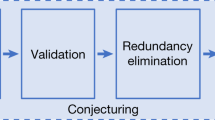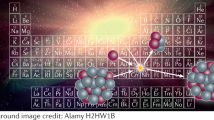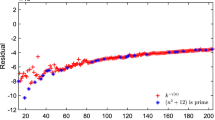Abstract
THE relatively quick succession of new elementary bodies which has marked the last decade of scientific progress and which must be considered as the result of chemical research, pioneered and guided by spectroscopic study, has brought very prominently into notice Mendeleeff's most remarkable law of the periodicity of the chemical elements.
This is a preview of subscription content, access via your institution
Access options
Subscribe to this journal
Receive 51 print issues and online access
$199.00 per year
only $3.90 per issue
Buy this article
- Purchase on Springer Link
- Instant access to full article PDF
Prices may be subject to local taxes which are calculated during checkout
Similar content being viewed by others
References
See Gauden, "Le Monde des Atomes", p. 32 (1873); also NATURE, vol. xxii. p. 56, "On the Physical Aspect of the Vortex-Atom Theory", by S. Tolver Preston .
Rights and permissions
About this article
Cite this article
O'REILLY, J. On the Equivalents of the Elementary Bodies Considered as Representing an Arithmetical Progression Deducible from Mendeleeff's Tables . Nature 24, 274–277 (1881). https://doi.org/10.1038/024274b0
Issue Date:
DOI: https://doi.org/10.1038/024274b0
Comments
By submitting a comment you agree to abide by our Terms and Community Guidelines. If you find something abusive or that does not comply with our terms or guidelines please flag it as inappropriate.



